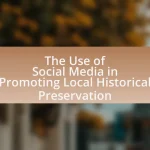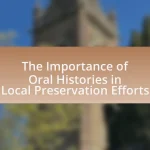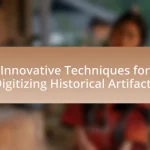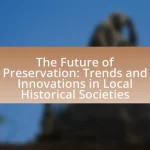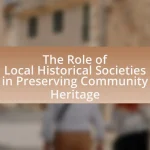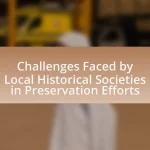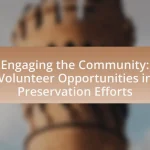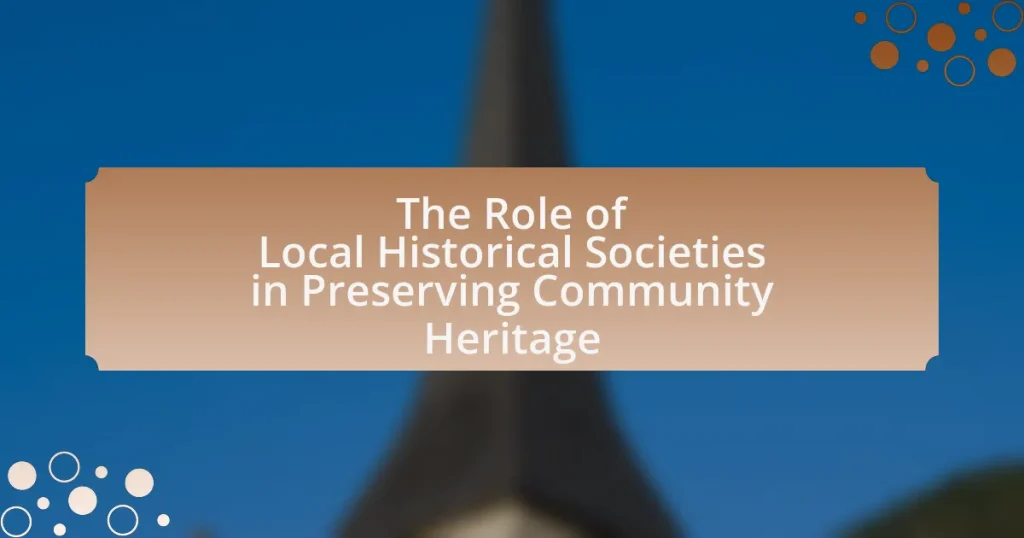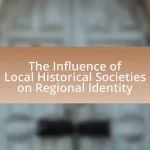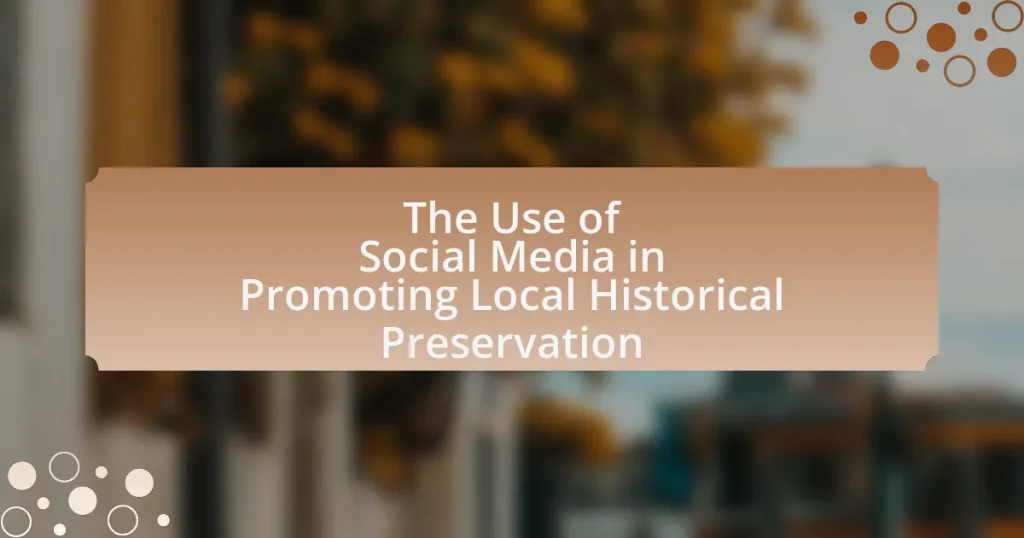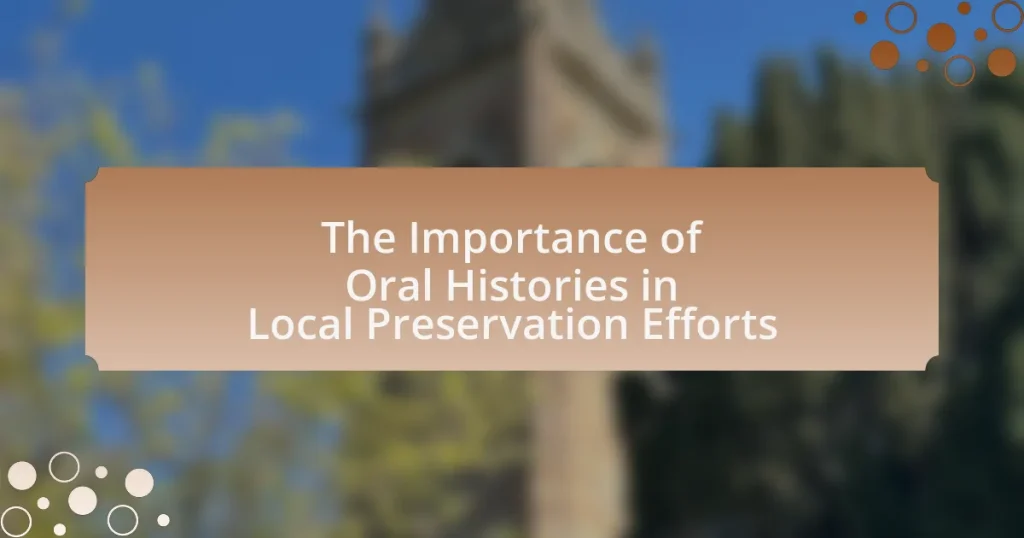Local historical societies are organizations focused on preserving and promoting the history and heritage of specific communities or regions. They play a vital role in documenting local narratives, conducting educational programs, and advocating for the protection of historical sites, thereby fostering community identity and continuity. The article explores the various activities these societies engage in for heritage preservation, their collaborations with other organizations, the challenges they face, and the importance of community support and volunteerism in sustaining their efforts. Additionally, it highlights best practices and successful case studies that demonstrate the impact of local historical societies on community heritage preservation.
What are Local Historical Societies and Their Purpose?
Local historical societies are organizations dedicated to preserving and promoting the history and heritage of a specific community or region. Their primary purpose is to collect, preserve, and interpret historical artifacts, documents, and narratives that reflect the local culture and history. These societies often engage in educational activities, such as hosting lectures, workshops, and exhibitions, to raise awareness about the significance of local history. Additionally, they may collaborate with other institutions, such as schools and museums, to enhance community engagement and historical research. Local historical societies play a crucial role in fostering a sense of identity and continuity within communities by ensuring that their unique histories are documented and shared.
How do Local Historical Societies contribute to community heritage preservation?
Local Historical Societies contribute to community heritage preservation by documenting, archiving, and promoting local history and culture. These societies often collect artifacts, photographs, and documents that reflect the unique narratives of their communities, ensuring that historical knowledge is maintained for future generations. For instance, the American Association for State and Local History reports that many local historical societies engage in educational programs and events that raise awareness about local heritage, fostering a sense of identity and continuity among residents. Additionally, they often collaborate with local governments and organizations to advocate for the protection of historic sites, thereby playing a crucial role in safeguarding the physical manifestations of community heritage.
What specific activities do these societies engage in for heritage preservation?
Local historical societies engage in various specific activities for heritage preservation, including organizing educational programs, conducting research, and maintaining archives. These societies often host workshops, lectures, and community events to raise awareness about local history and heritage. They also collect and preserve artifacts, documents, and photographs that are significant to the community’s past. Additionally, many societies collaborate with local governments and organizations to advocate for the protection of historical sites and promote heritage tourism, thereby ensuring that the community’s cultural legacy is recognized and preserved for future generations.
How do Local Historical Societies collaborate with other organizations?
Local Historical Societies collaborate with other organizations through partnerships, joint events, and resource sharing. These collaborations often involve working with schools, museums, and cultural institutions to promote local history and heritage. For instance, societies may co-host educational programs or exhibitions that highlight regional history, thereby increasing community engagement and awareness. Additionally, they may share archival materials and expertise with local governments or nonprofits to support preservation efforts, ensuring that historical resources are accessible and well-maintained. Such collaborations enhance the impact of local historical societies by pooling resources and expertise, ultimately benefiting the community’s understanding of its heritage.
Why are Local Historical Societies important for community identity?
Local Historical Societies are crucial for community identity because they preserve and promote the unique history and cultural heritage of a community. By documenting local events, traditions, and notable figures, these societies create a sense of belonging and continuity among residents. For instance, they often maintain archives, host educational programs, and organize events that celebrate local history, which fosters community pride and engagement. Studies have shown that communities with active historical societies report higher levels of civic participation and social cohesion, reinforcing the idea that understanding local history is integral to forming a collective identity.
In what ways do they foster a sense of belonging among community members?
Local historical societies foster a sense of belonging among community members by organizing events that celebrate local history and culture. These events, such as heritage festivals, workshops, and lectures, encourage community participation and engagement, allowing individuals to connect with their shared past. For instance, a study by the American Association for State and Local History found that communities with active historical societies report higher levels of civic engagement and social cohesion. By preserving and promoting local heritage, these societies create a collective identity that strengthens community ties and fosters pride among residents.
How do they educate the public about local history?
Local historical societies educate the public about local history through various programs and initiatives. They organize workshops, lectures, and guided tours that highlight significant historical events and figures in the community. For example, many societies create educational materials such as brochures and online resources that provide detailed information about local heritage sites. Additionally, they often collaborate with schools to integrate local history into the curriculum, ensuring that students learn about their community’s past. These efforts are supported by historical research and documentation, which validate the information shared with the public.
What Challenges do Local Historical Societies Face?
Local historical societies face several significant challenges, including funding shortages, volunteer recruitment, and public engagement. Funding is often limited, as many societies rely on donations and grants, which can fluctuate and may not cover operational costs. Additionally, attracting and retaining volunteers is difficult, as many individuals have competing commitments, leading to a lack of manpower for events and preservation efforts. Public engagement is also a challenge; societies must find effective ways to connect with the community and raise awareness about their activities and the importance of local history. These challenges hinder the ability of local historical societies to fulfill their mission of preserving community heritage effectively.
How do funding issues impact their operations?
Funding issues significantly hinder the operations of local historical societies by limiting their ability to maintain facilities, conduct research, and offer educational programs. Without adequate financial resources, these organizations struggle to preserve artifacts, which diminishes their capacity to fulfill their mission of safeguarding community heritage. For instance, a study by the American Association for State and Local History found that 60% of historical societies reported funding constraints as a major barrier to their operational effectiveness, leading to reduced public engagement and fewer community events.
What are the common sources of funding for these societies?
Common sources of funding for local historical societies include grants, membership fees, donations, and fundraising events. Grants are often provided by government agencies, foundations, and nonprofit organizations specifically aimed at preserving cultural heritage. Membership fees contribute to the operational budget, while donations from individuals and businesses support specific projects or general expenses. Fundraising events, such as auctions or community gatherings, also generate revenue and foster community engagement. These funding sources are essential for the sustainability and effectiveness of local historical societies in their mission to preserve community heritage.
How can societies overcome financial challenges?
Societies can overcome financial challenges by diversifying their funding sources. This includes seeking grants from government and private foundations, engaging in fundraising activities, and establishing partnerships with local businesses. For instance, according to the National Council of Nonprofits, organizations that diversify their funding are more resilient during economic downturns, as they are not reliant on a single source of income. Additionally, implementing cost-effective measures and enhancing community engagement can further strengthen financial stability, as seen in successful local historical societies that actively involve community members in fundraising efforts and volunteer programs.
What role does volunteerism play in Local Historical Societies?
Volunteerism is essential in Local Historical Societies as it provides the manpower and expertise necessary for preserving and promoting community heritage. Volunteers engage in various activities such as organizing events, conducting research, and maintaining historical sites, which are crucial for the operational sustainability of these societies. For instance, a study by the National Trust for Historic Preservation found that volunteer contributions significantly enhance the capacity of local organizations to manage heritage projects, with volunteers often accounting for over 50% of the workforce in many historical societies. This active participation not only helps in the preservation of local history but also fosters community engagement and education about cultural heritage.
How do volunteers contribute to the success of these organizations?
Volunteers significantly enhance the success of local historical societies by providing essential manpower and diverse skills. Their contributions include organizing events, conducting research, and engaging the community, which are vital for preserving and promoting community heritage. For instance, a study by the National Council for History Education found that organizations with active volunteer programs reported a 30% increase in community engagement and event attendance, demonstrating the direct impact of volunteer involvement on organizational effectiveness.
What strategies can societies use to recruit and retain volunteers?
Societies can recruit and retain volunteers by implementing targeted outreach, providing meaningful engagement opportunities, and recognizing volunteer contributions. Targeted outreach involves identifying potential volunteers through community events, social media campaigns, and partnerships with local organizations, which can increase awareness and interest in volunteer opportunities. Providing meaningful engagement opportunities, such as hands-on projects related to community heritage, fosters a sense of purpose and connection among volunteers. Recognition of volunteer contributions, through awards or public acknowledgment, enhances motivation and encourages continued involvement. Research indicates that organizations with structured volunteer recognition programs see higher retention rates, demonstrating the effectiveness of these strategies in maintaining a committed volunteer base.
How can Communities Support Local Historical Societies?
Communities can support local historical societies by actively participating in fundraising efforts, volunteering time, and promoting awareness of historical events and resources. Engaging in fundraising activities, such as community events or grant applications, provides essential financial resources that enable historical societies to maintain their operations and preserve local heritage. Volunteering time for events, research, or administrative tasks helps alleviate the workload on society staff and fosters a sense of community involvement. Additionally, promoting awareness through social media, local newsletters, and community gatherings can increase public interest and participation in historical society initiatives, ultimately enhancing the preservation of community heritage.
What are effective ways for community members to engage with these societies?
Community members can effectively engage with local historical societies by participating in events, volunteering for projects, and contributing to discussions. Participation in events such as lectures, workshops, and exhibitions allows individuals to learn about local history and share their own experiences. Volunteering for projects, such as archival work or organizing community events, fosters a sense of ownership and connection to the society’s mission. Additionally, contributing to discussions, whether through attending meetings or providing feedback on initiatives, encourages collaboration and strengthens community ties. These methods not only enhance individual involvement but also support the society’s efforts in preserving community heritage.
How can local businesses partner with historical societies for mutual benefit?
Local businesses can partner with historical societies by sponsoring events, providing financial support, or offering in-kind donations, which can enhance community engagement and visibility for both entities. For instance, a local restaurant might sponsor a historical walking tour organized by a historical society, gaining exposure while helping to promote local heritage. This collaboration can lead to increased foot traffic for the business and heightened awareness of the historical society’s mission. Additionally, businesses can host events at their locations that highlight local history, creating a unique experience that attracts customers and fosters community pride. Such partnerships not only strengthen local economies but also contribute to the preservation of community heritage by promoting awareness and appreciation of historical resources.
What events can communities organize to raise awareness and support?
Communities can organize educational workshops and historical reenactments to raise awareness and support for local heritage. Educational workshops can provide information about the community’s history, traditions, and preservation efforts, fostering engagement and understanding among residents. Historical reenactments allow participants to experience and appreciate the community’s past, creating a tangible connection to heritage. These events not only inform but also encourage community involvement, as evidenced by successful initiatives in various towns that have seen increased participation and support for local historical societies.
What best practices can enhance the effectiveness of Local Historical Societies?
Local Historical Societies can enhance their effectiveness by actively engaging the community through educational programs and events. These initiatives foster a deeper understanding of local history and encourage participation, which can lead to increased membership and support. For instance, hosting workshops, lectures, and exhibitions can attract diverse audiences and promote historical awareness. Additionally, collaborating with schools and local organizations can expand outreach and resources. Research indicates that societies that implement community-driven projects see a 30% increase in volunteer involvement, demonstrating the impact of active engagement on effectiveness.
How can societies leverage technology for heritage preservation?
Societies can leverage technology for heritage preservation by utilizing digital archiving, 3D modeling, and virtual reality to document and recreate historical sites and artifacts. Digital archiving allows for the systematic collection and storage of historical documents and images, making them accessible to a wider audience and ensuring their longevity. For instance, the Library of Congress has digitized millions of items, preserving them for future generations. 3D modeling enables the accurate representation of physical structures, which can be used for restoration projects or educational purposes, as seen in the reconstruction of ancient ruins like Pompeii. Virtual reality offers immersive experiences that allow users to explore heritage sites remotely, enhancing public engagement and education, exemplified by projects like Google Arts & Culture, which provides virtual tours of museums and historical landmarks. These technological applications not only safeguard cultural heritage but also promote awareness and appreciation among communities.
What are some successful case studies of Local Historical Societies?
Successful case studies of Local Historical Societies include the Newburyport Historical Society in Massachusetts, which revitalized interest in local history through engaging educational programs and community events, leading to a 30% increase in membership over three years. Another example is the San Diego History Center, which successfully integrated technology into its exhibits, resulting in a 50% increase in visitor engagement and a significant boost in funding through grants and donations. These cases demonstrate how Local Historical Societies can effectively preserve community heritage while fostering community involvement and financial sustainability.
How can individuals contribute to preserving community heritage through Local Historical Societies?
Individuals can contribute to preserving community heritage through Local Historical Societies by actively participating in their programs and initiatives. This involvement can include volunteering for events, assisting with archival research, and helping to organize educational workshops that promote local history. For instance, according to the American Association for State and Local History, community members who engage with historical societies can help document and preserve local narratives, artifacts, and traditions, thereby ensuring that these elements are maintained for future generations. Additionally, individuals can support fundraising efforts, which are crucial for the operational sustainability of these societies, enabling them to continue their heritage preservation work.

